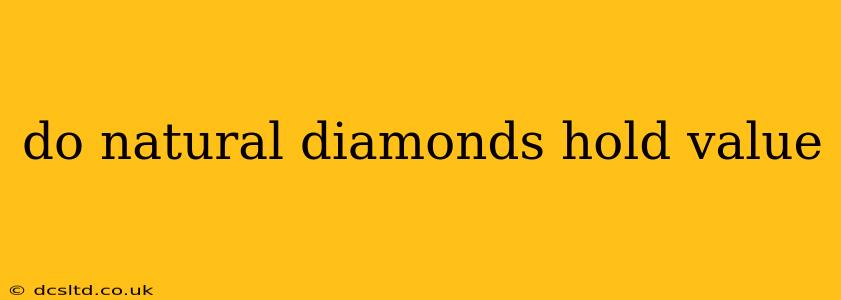Diamonds. The word conjures images of sparkle, luxury, and enduring romance. But beyond the allure, a critical question arises for prospective buyers and owners: do natural diamonds hold their value? The short answer is: it's complicated. While diamonds are often touted as a valuable investment, their price stability is far from guaranteed. Several factors influence whether a natural diamond retains or appreciates in value. Let's delve into the specifics.
What Factors Influence Diamond Value Retention?
Several key factors determine whether a diamond maintains its worth over time. Understanding these elements is crucial for making informed decisions about diamond purchases.
1. The Four Cs: Cut, Clarity, Carat, and Color
The most significant determinants of a diamond's value are the renowned "Four Cs":
-
Cut: A well-cut diamond maximizes brilliance, fire, and scintillation, making it significantly more desirable and valuable. Poorly cut diamonds, even if possessing high carat weight and clarity, will appear dull and less valuable.
-
Clarity: This refers to the presence of inclusions (internal flaws) and blemishes (external flaws). Flawless diamonds are exceptionally rare and command the highest prices. However, minor inclusions often remain invisible to the naked eye, and their impact on value is less pronounced.
-
Carat: Carat refers to the weight of the diamond. Larger diamonds are generally more valuable, but the increase in price isn't always proportional to the weight increase. A 1-carat diamond doesn't cost twice as much as a 0.5-carat diamond of the same quality.
-
Color: Diamonds range in color from colorless (D) to lightly colored (Z). Colorless diamonds are the most sought after and command higher prices. Slight color variations may not be noticeable to the untrained eye, yet affect the overall value.
2. Diamond Certification and Grading Reports
A reputable grading report from a recognized gemological laboratory (like GIA or AGS) is essential for establishing a diamond's value. These reports provide objective assessments of the Four Cs and offer a crucial benchmark for resale. Diamonds without certification are considerably harder to resell and may fetch lower prices.
3. Market Demand and Trends
The diamond market, like any other, is subject to fluctuations in demand and trends. Economic conditions, fashion preferences, and even social perceptions can influence prices. Currently, there's a rising interest in ethically sourced diamonds, which can impact the value of diamonds lacking proper certification regarding their origin.
4. Resale Market and Liquidity
Reselling a diamond can be challenging. Private sales often yield lower prices than professional appraisals might suggest. Auction houses or reputable jewelers might offer better returns, but their fees can eat into the profits. Therefore, diamonds are not considered highly liquid assets.
H2: Is a Diamond a Good Investment?
This is a frequently debated topic. While diamonds can retain some value, they're not typically viewed as robust investments like stocks or real estate. Their value appreciation is not guaranteed and can be significantly impacted by the factors mentioned above. They're more accurately considered luxury goods rather than secure investments.
H2: How Can I Maximize the Value of My Diamond?
To protect your diamond’s value:
- Purchase from reputable sources: This ensures the diamond's authenticity and quality.
- Obtain a grading report: A certified report provides crucial documentation for resale.
- Proper insurance: Protect your investment against loss or damage.
- Regular cleaning and care: Maintain the diamond's sparkle and brilliance.
H2: What are the alternatives to natural diamonds?
Many consumers are now considering lab-grown diamonds or other gemstones as alternatives. Lab-grown diamonds possess similar chemical and physical properties to natural diamonds but are often significantly less expensive. The choice between natural and lab-grown depends on personal preference and budget.
H2: Can I easily sell my diamond?
Selling a diamond privately can be difficult. You may receive offers significantly below market value. Utilizing a reputable jeweler or auction house is likely to yield better results but comes with fees. Liquidity for diamonds is relatively low.
In conclusion, while natural diamonds can hold value, it's not guaranteed. Several factors influence their price, and they are not a reliable investment in the same vein as stocks or real estate. Their worth is tied to subjective factors, market conditions, and the diamond's inherent characteristics. Careful consideration of the Four Cs, obtaining a grading report, and understanding the resale market are crucial steps for those considering purchasing or selling natural diamonds.
